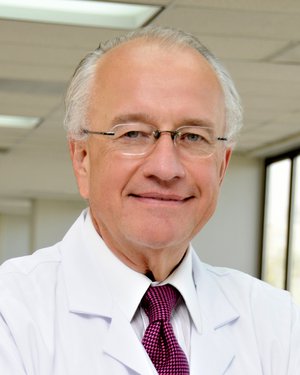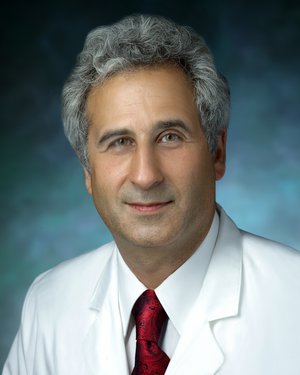Research Lab Results
-
John Sampson Lab
Researchers in the John Sampson Lab investigate relevant, appropriate, affordable and sustainable ways to improve anesthesia and perioperative care in low-resource settings. The team’s research interests include the Universal Anesthesia Machine; interpersonal relationships between anesthesia providers and their patients; how the quality of those relationships impacts professionalism, autonomy, anxiety, patient cooperation and patient satisfaction; how disease influences cerebrovascular reactivity as measured by MRI; and how education and communication can improve medical care in Africa and other austere environments. The team is currently working with clinicians in Ghana, Ethiopia and Kenya. -
John Schroeder Lab
The John Schroeder Lab focuses on understanding the role human basophils and mast cells play in allergic reactions, as it relates not only to their secretion of potent inflammatory mediators (e.g., histamine and leukotriene C4) but also to their production of pro-inflammatory cytokines. We have long utilized human cells rather than cell lines in order to address the parameters, signal transduction and pharmacological aspects underlying clinically relevant basophil and mast cell responses. As a result, the lab has established protocols for rapidly isolating large numbers of basophils at high purity from human blood and for growing culture-derived mast cells/basophils from human progenitor cells. A variety of assays and techniques are also in place for concurrently detecting cytokines and mediators following a wide range of stimuli. These have facilitated the in vitro testing of numerous anti-allergic drugs for inhibitory activity on basophil and mast cell activation. The lab also studies counter-regulation between the IgE and innate immune receptors on human immature dendritic cell subtypes.
-
John Ulatowski Lab
Research in the John Ulatowski Lab explores the regulatory mechanisms of oxygen delivery to the brain and cerebral blood flow. Our work includes developing and applying new techniques and therapies for stroke as well as non-invasive techniques for monitoring brain function, fluid management and sedation in brain injury patients. We also examine the use of novel oxygen carriers in blood. We’ve recently begun exploring new methods for perioperative and periprocedural care that would help to optimize patient safety in the future. -
Johns Hopkins Center for Fetal Therapy Research
Johns Hopkins experts have been at the forefront of research into the benefits and proven outcomes of the most advanced prenatal surgery techniques to treat a range of conditions including congenital diaphragmatic hernia (CDH), spina bifida and twin-to-twin transfusion syndrome (TTTS). -
Johns Hopkins Evidence-Based Practice Center
The Johns Hopkins Evidence-Based Practice Center conducts comprehensive, systematic reviews of important medical topics using interdisciplinary teams that integrate clinical expertise in evidence-based methods, including meta-analysis, decision analysis, benefit-harms analysis and cost-effectiveness analysis.
-
Johns Hopkins Fertility Center Research
Research with the Johns Hopkins Division of Reproductive Endocrinology and Infertility (REI) has recently focused on perimenopause and menopause and risks for hot flashes, fertility preservation and on making advances in improving success rates for assisted reproductive technologies. Past research efforts focused on hormonal contraception, prolactin disorders and polycystic ovarian syndrome. -
Johns Hopkins Medicine Technology Innovation Center (TIC)
The TIC works with interdisciplinary teams to bring digital health products to life in clinical settings at Johns Hopkins Health System. TIC offers design, development, business, and project management partnership to solve clinical problems that span the range of medical specialties and practice settings. Through community-based events and programs, the TIC also works to train the next wave of digital health innovators and builds start-up teams with the tools to launch commercial products improving patient care at Johns Hopkins and across the industry. -
Johns Hopkins University Dermatology, Allergy and Clinical Immunology (DACI) Reference Laboratory
The mission of the Johns Hopkins University Dermatology, Allergy and Clinical Immunology (DACI) Reference Laboratory is to provide comprehensive, high-quality diagnostic allergy and immunology testing to patients throughout North America with asthma, allergy and immunologic disorders. We offer an extensive menu of laboratory tests that includes allergen-specific IgE measurements to approximately 300 pollen, epidermal, mold spore, mite, food, drug, venom and occupational allergen specificities. We specialize in Hymenoptera (insect sting) venom-specific IgE and IgG antibody measurements. In addition, the DACI Laboratory performs hypersensitivity pneumonitis precipitin panels, serum cotinine, and environmental mold measurements. -
Johnston-Hwang Lab
Development and optimization of stem cell and regenerative therapies for heart failure and myocardial infarction. CardiAMP Heart Failure Trial, Implantable Bioreactor for Prevention of Adverse Remodeling after Myocardial Infarction
-
Jonathan Golub Lab
Research in the Jonathan Golub Lab focuses primarily on the epidemiology of tuberculosis (TB), specifically in patients infected with HIV. We work with the CDC to explore potential delays in TB diagnoses as well as the risk factors that contribute to death from TB in the United States. Our research also includes ongoing studies of HIV and TB patients in Brazil and South Africa.





